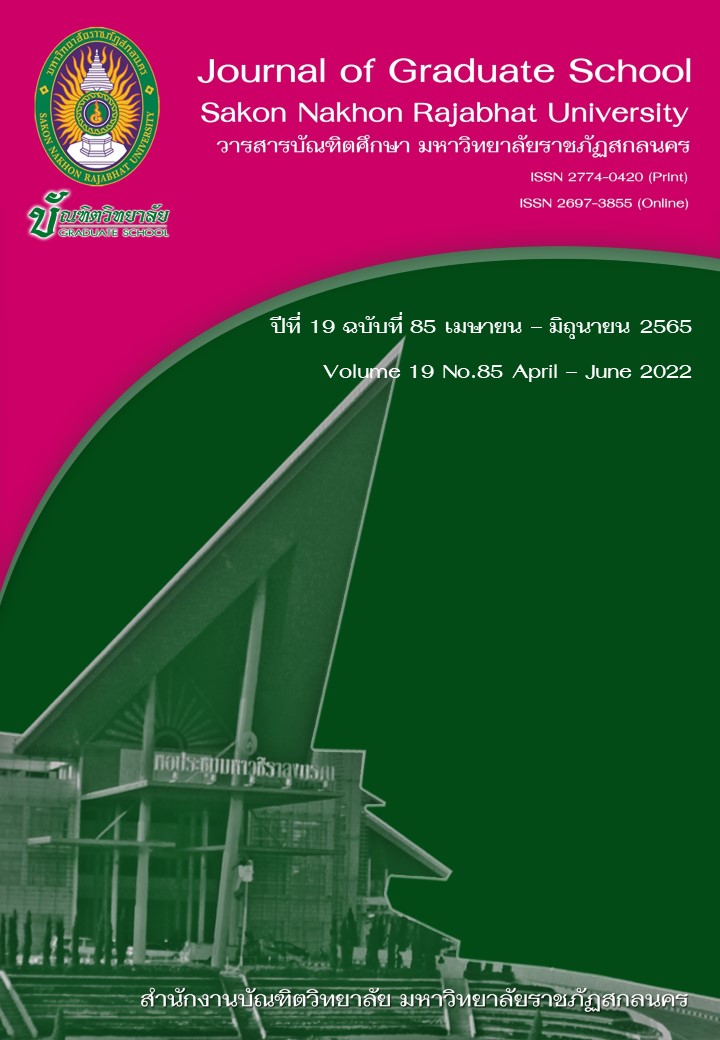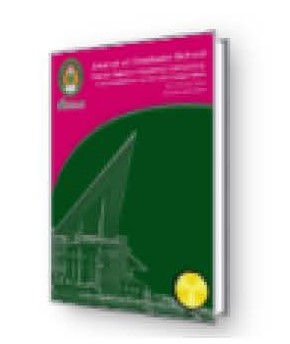สภาพปัจจุบัน สภาพที่พึงประสงค์ ความต้องการจำเป็นในการพัฒนาภาวะผู้นำการเปลี่ยนแปลง
คำสำคัญ:
ภาวะผู้นำการเปลี่ยนแปลง, ผู้บริหารระดับสาขาวิชา, มหาวิทยาลัยนครพนมบทคัดย่อ
การวิจัยครั้งนี้มีวัตถุประสงค์เพื่อ1) ศึกษาสภาพปัจจุบัน สภาพที่พึงประสงค์ของภาวะผู้นำการเปลี่ยนแปลงของผู้บริหารระดับหัวหน้าสาขาวิชา มหาวิทยาลัยนครพนม 2) ศึกษาความต้องการจำเป็นในการพัฒนาภาวะผู้นำการเปลี่ยนแปลงของผู้บริหารระดับหัวหน้าสาขาวิชา มหาวิทยาลัยนครพนม โดยมีประชากรเป็นผู้บริหารระดับหัวหน้าสาขาวิชาจำนวน 44 คน เครื่องมือที่ใช้ในการเก็บรวบรวมข้อมูล ได้แก่ แบบสอบถามมาตราส่วนประมาณค่า 5 ระดับ มีค่าอำนาจจำแนกระหว่าง .39-.87 และความเชื่อมั่นทั้งฉบับ 0.95 สถิติที่ใช้ในการวิเคราะห์ข้อมูล ได้แก่ ร้อยละ ค่าเฉลี่ย ส่วนเบี่ยงเบนมาตรฐาน และค่าดัชนีความต้องการจำเป็น (Priority Need of Index) ผลการวิจัย พบว่า 1. สภาพปัจจุบันและสภาพที่พึงประสงค์ภาวะผู้นำการเปลี่ยนแปลงของผู้บริหารระดับหัวหน้าสาขาวิชาโดยรวมอยู่ในระดับมาก ส่วนสภาพที่พึงประสงค์โดยรวมอยู่ในระดับมากเมื่อพิจารณาเป็นรายด้าน พบว่า แต่ละด้านมีสภาพปัจจุบันอยู่ในระดับมากทุกด้าน และสภาพที่พึงประสงค์อยู่ในระดับมากทุกด้านเช่นเดียวกัน 2. ความต้องการจำเป็นในการพัฒนาภาวะผู้นำการเปลี่ยนแปลงของผู้บริหารระดับหัวหน้าสาขาวิชาโดยเรียงตามลำดับค่าดัชนีความต้องการจำเป็นจากมากไปหาน้อย คือ ด้านการสร้างแรงบันดาลใจ ด้านการคำนึงถึงความเป็นปัจเจกบุคคล ด้านการกระตุ้นการใช้ปัญญา ด้านการเป็นแบบอย่างที่ดี และด้านการมีวิสัยทัศน์ ตามลำดับ
เอกสารอ้างอิง
แคทลียา ศรีใส. (2548). ความสัมพันธ์ระหว่างภาวะผู้นําการเปลี่ยนแปลงกับการสร้างทีมงานของผู้บริหารโรงเรียนเอกชน สำนักผู้ตรวจราชการประจำเขตตรวจราชการที่ 3. วิทยานิพนธ์ กศ.ม. ชลบุรี: มหาวิทยาลัยบูรพา.
ฐิติพงศ์ คล้ายใยทอง. (2547). พฤติกรรมภาวะผู้นำการเปลี่ยนแปลงของผู้บริหารสถานศึกษาสังกัดสำนักงานเขตพื้นที่การศึกษาสระบุรี เขต 1. วิทยานิพนธ์ ค.ม. ลพบุรี: มหาวิทยาลัยราชภัฎเทพสตรี.
ณัฏฐพันธ์ เขจรนันทน์. (2546). กลยุทธ์การเปลี่ยนแปลงและการพัฒนาองค์การ. กรุงเทพฯ: เอ็กซเปอร์เน็ท.
บุญชม ศรีสะอาด. (2556). การวิจัยเบื้องต้น. (พิมพ์ครั้งที่ 9). กรุงเทพฯ. สุริวิยาสาส์น.
ธีระ รุญเจริญ ปราชญา กล้าผจัญ และสัมมนา รธนิธย์. (2545). การบริหารเพื่อการปฏิรูปการเรียนรู้. กรุงเทพฯ: ข้าวฟ่าง
พรชัย เจดามาน และคณะ. (2559). ยุทธศาสตร์การพัฒนาเพื่อการบริหารจัดการสู่การเปลี่ยนผ่านศตวรรษที่ 21: ไทยแลนด์ 4.0. วารสารหลักสูตรและการเรียนการสอน คณะครุศาสตร์ มหาวิทยาลัยราชภัฏมหาสารคาม. 2(1), 2-3.
รังสรรค์ ประเสริฐศรี. (2544). ภาวะผู้นำ (Leadership). (พิมพ์ครั้งที่ 2). กรุงเทพฯ: (ม.ป.พ.).
รัตติกรณ์ จงวิศาล. (2543). ผลการฝึกอบรมภาวะผู้นำการเปลี่ยนแปลงของผู้นำนิสิต มหาวิทยาลัยเกษตรศาสตร์. วิทยานิพนธ์ วท.ด. กรุงเทพฯ: มหาวิทยาลัยศรีนครินทรวิโรฒ.
วุฒิไกร เถยสูงเนิน. (2548). ภาวะผู้นําของผู้บริหารที่มีต่อประสิทธิผลของงานของพนักงานสาขาไทยพาณิชย์ จํากัด (มหาชน) สํานักงานเขตพื้นที่วิสุทธิกษัตริย์. วิทยานิพนธ์ ศศ.ม. กรุงเทพฯ: มหาวิทยาลัยราชภัฏสวนสุนันทา.
วิโรจน์ สารรัตนะ. (2557). ภาวะผู้นํา: ทฤษฎีและนานาทัศนะร่วมสมัยปัจจุบัน. กรุงเทพฯ: สํานักพิมพ์ทิพย์วิสุทธิ์.
สุเทพ พงศ์ศรีพัฒน์. (2550). ภาวะผู้นำทฤษฎีและปฏิบัติ: ศาสตร์และศิลป์สู่ความเป็นผู้นำที่สมบูรณ์. (พิมพ์ครั้งที่ 2). เชียงราย: มหาวิทยาลัยราชภัฏเชียงราย.
สุวิมล ว่องวาณิช. (2558). การวิจัยประเมินความต้องการจำเป็น. กรุงเทพฯ: สำนักพิมพ์แห่งจุฬาลงกรณ์มหาวิทยาลัย.
Astin, A.W. & R. Scherrei. (1980). Maximizing Leadership Effectiveness. San Francisco: Jossey-Bass.
Bass, B.M. (1985). Leadership and Performance Beyond Expectation. New York: The Free Press.
. (1990). From Transactional to Transformational Leadership: Learning to Share the Vision. Organizational Dynamics, 18(1), 19-31.
. (2006). Transformational Leadership. (2nd ed.). Englewood Cliffs, NJ: Prentice-Hall.
Bass, B.M. & B.J. Avolio. (1994). Improving Organizational Effectiveness Through Transformational Leadership. California: Sage.
Bass, B. M., & Riggio, R. E. (2006). Transformational leadership. Mahwah, NJ: Erlbaum.
Barker, A.N. (1992). Transformational nursing leadership: A vision for Future. New York: National League for Nursing.
Cook, G., Hunsaker, P. & R. Coffey. (1997). Management and Organizational Behavior. (2nd ed). Chicago: McGraw-Hill.
Dessler, G. (1998). Management: Leading People and Organizations in the 21 Century. New Jersey: Prentice Hall.
Fullan, M. (2006). Change Theory: A Force for School Improvement, in The Development of Transformational Leaders for the Educational Decentralization. Bangkok: Ministry of Education.
Hoy, W. K., & Miskel, C. (2001). Educational administration: Theory, research and practice. (6th ed). Singapore: McGraw-Hill book Co-Singapore for Manufacture and export.
James, M. B., (2010). Leadership. New York: Harper Perennial Modern Classices.
Leithwood, K. & Fernundez, J. (1994). Changing Leadership for changing times. Philadelphia: Open University Press.
Leithwood, K. & D.L. Duke. (1999). A Century’s Quest to Understand School Leadership. In Murphy, J. and Louis, K.S. (Eds). Handbook of Research on Educational Administrators. California: Jossey-Bass.
Leithwood, K., Jantzi, D. & R. Steinbach. (1999). Changing Leadership for Changing Times. San Francisco: Open University Press.
Rosser, V.J., Johnsrud, L.K. & R.H. Heck. (2003). Academic Deans and Directors: Assessing Their Effectiveness from Individual and Institutional Perspectives. The Journal of Higher Education, 74(1), 1-25.
Tichy, N. M., & Devanna, M. A. (1986). The Transformational Leader. New York: Riley.
Yukl, G.A. (2002). Leadership in Organizations International. (5th ed). New Jersey: Prentice Hall.
ดาวน์โหลด
เผยแพร่แล้ว
รูปแบบการอ้างอิง
ฉบับ
ประเภทบทความ
สัญญาอนุญาต
ลิขสิทธิ์ (c) 2022 วารสารบัณฑิตศึกษา มหาวิทยาลัยราชภัฏสกลนคร

อนุญาตภายใต้เงื่อนไข Creative Commons Attribution-NonCommercial-NoDerivatives 4.0 International License.
บทความทุกบทความที่ตีพิมพ์ในวารสารบัณฑิตศึกษา มหาวิทยาลัยราชภัฏสกลนคร ถือว่าเป็นลิขสิทธิ์ของบัณฑิตวิทยาลัย มหาวิทยาลัยราชภัฏสกลนคร






